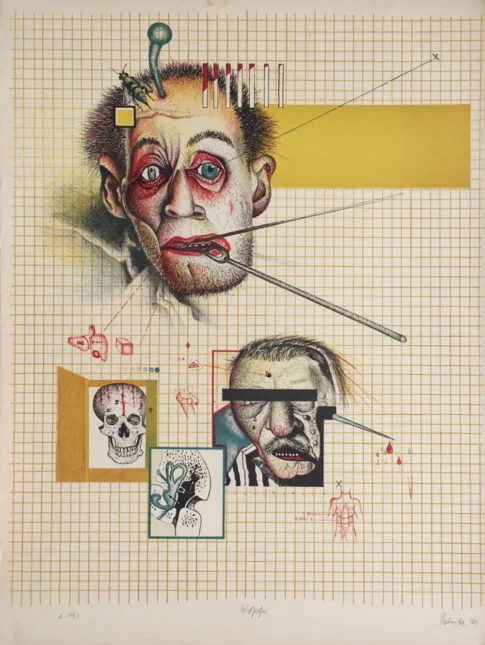
Ed Valfre
“Most octopuses live only a year or two, depending on the species.Humans, obviously, live much, much longer. And because length of life and intelligence seem connected in some way, a question naturally arises. What use is intelligence in such a very short life, especially since, as Godfrey-Smith puts it, “the machinery of intelligence is expensive, both to build and to run”? This conundrum has led to some questionable conclusions, including “a hypothesis of ‘accidental intelligence,’” as though octopuses had mistakenly developed “‘too much brain’ for animals living such brief and asocial lives.” But if their intelligence is accidental, then in what sense is human intelligence not accidental? Much as we marvel at the brief lives of these fascinating creatures, octopuses might marvel at the fact that humans have to bear the burden of being intelligent for decades on end. Could it be that we have “too much brain” for animals living such long and complex lives? Or too much life for the brains we have?”
Verlyn Klinkenborg (NYRB ‘Such Flexible Intensity of Life’ 2025)
“To deny the possibility of false consciousness is to assume there has been no indoctrination, no socialization… no control of information and commentary, no limitation of the topics to be considered in the national debate, no predetermination of issue agendas, and that a whole array of powers have not helped prestructure how we see and define our own interests and options.”
Michael Parenti (Dirty Truths, 1996)
“Et pourqois d’ailleurs no serait-on pas pederaste a Paris sous l’occupation?”
Jean Quéval (Première page, cinquième colonne )
I have been busy writing a screenplay for a young director I know. And that work is hardly finished, but I thought I would knock out a short piece to help clear my brain a little. Anyway, this is the explanation for a long break in blog posts here.
Today, the world operates symbolically on social media. Presidents have twitter (X) accounts and make tiktok videos. Zionist billionaires buy up media platforms, and studios, much as they have bought politicians for decades. In fact the tentacles of Zionist propaganda reach to every corner of existence. Our daily lives are infested with Zionist rhetoric. Academia is infested with Zionist propaganda and historical revisionism. Yesterday, Israel assassinated Qatari negotiators on a road outside Sharm El-Sheikh. Its called an accident, but it was not an accident. Mossad’s very motto is ‘Its never an accident’. Egyptian police are investigating. That’s the punch line to a seventy year old joke. Israel is the improved Murder Inc.

Kurt Pischler, photography.
This is peak disinformation now, it is about as complete as its possible to make propaganda. It is hegemonic spin by the U.S. attack dog garrison state of Israel. Because it’s not really Israel, per se, it’s the United States. The U.S. owns Israel, even if it doesn’t seem that way (which is itself another aspect of the propaganda). The US needs to manufacture colonial states (and apartheid states) that subjugate the people, the workers and the so called surplus population, and present it as a model. Israel serves multiple purposes, but that is one of them. I suspect the settler faction is inconvenient and probably won’t last too much longer. The Kahanists were not part of the plan, I don’t think. But the U.S. ruling class don’t really care. Much as the U.S. and its capitalist chieftons supported apartheid in Africa, just as the gilded age billionaires (Rockefeller, DuPont, Carnegie, Vanderbilts, and Morgans et al) were happy with Colonialism and occupation (like the British aristocracy), today’s ruling class, the new tech bro Silicon Valley wealthy, are perfectly fine with the same eugenicist logic that fueled Hitler, that drove the slave trade before that, only today trick out these values in the clothes of AI and data collection and mass surveillance. The prisons are meant to be digital today and not material. But one cannot think Musk or Gates or Ellison would care if a new King Leopold were chopping off the hands of their workers? The problem is that these new billionaires (Musk and Gates and Ellison and Bezos et al) are really not nearly as savvy as old man Rockefeller or Vanderbilt. Or J.P. Morgan or old John Jacob and George Astor. The Astor’s held onto the opium trade in the U.K. for a long while (and woodwind instruments, oddly) before essentially owning New York City. But I digress. The new class, from the odious and delusional Musk (just don’t trust white South Africans) to Peter Thiel, are as intoxicated and blinded by propaganda as anyone, even if they themselves manufactured much of it. Those 19th century robber barons were shrewd and merciless, but also gave back huge amounts in the form of building libraries and trusts and public works projects. They were philanthropists. Musk has never given to a single humanitarian cause. Nor Bezos. Not one cent. Zero. But this is not really my point.
Western society has reached the culmination of the project that began with the Industrial Revolution. And this in turn, this idea of ‘progress’ was gestated very much further back, perhaps to the dawn of humankind. At least to the dawn of alphabets and language. From the earliest mythes of humankind there are a constellation of questions that people faced, or more to the point, didn’t face but turned away from, that are tied into our unconscious, our dreams, and our sense of relatedness with fellow humans. And today, there is a concerted effort to erase Marxist analysis, and to erase psychoanalysis. And in the case of of the latter I mean the radical Freudianism of the Vienna circle and not the neuro-cognitive pharmacological adjustment therapy so popular in the West. That neuro-biological focus is part of the same delusion we see with AI and game theory and computer modelling.

Ralf Dereich
The hostility to psychoanalysis comes from both the hard right (MAGA supporters, white nationalists et al) and the left (Gabe Rockhill and friends, but also in general most of the communists I know are at least nominally anti Freud). You know who wasn’t against psychoanalysis? The U.S. government, who employed many well known psychoanalyists and psychiatrists, and consulted many more. The advertising realm also employed psychologists, rather obviously. Allan Dulles had an ongoing exchange of letters and even phone calls with Carl Jung. And this very reactionary (fascistic) part of Jung is what makes him so problematic to evaluate. But I will get to that. The point here is that Western capital, the new Silicon Valley and Zionist billionaires, believe deeply in Freudian explanations. In Academia (much like Germany after WW2) there has been a stocking of departments with liberal default defenders of the status-quo. Academics like Steven Pinker are typical of the tenured academic today. There are exceptions but the assault on education, that began with Reagan, is now carried on by Zionist censors and cancelers. There is a joke there about chancellors/cancelers. But I can’t quite find it. Blaming a failure of class consciousness on Freud and Adorno and Marcuse has much more to do with failed Oedipal narratives than it does on anything missed in Marx. In fact, everyone from Pasolini to Debord to Wilhelm Reich saw the importance of sexuality. And saw the links to fascism.
There is an amusing and not stupid video out on UFOs and the history of U.S. government brainwashing programs and projects like MK Ultra (and Operation Paperclip, which clearly was the grandfather of post MK Ultra indoctrination). And this video, by Matthew Ehret (via Cynthia Chung) can be seen here https://open.substack.com/pub/cynthiachung/p/film-premiere-the-hidden-hand-behind?r=12qzc&utm_campaign=post&utm_medium=web&showWelcomeOnShare=false
There are many much more detailed accounts of all this but I still think this video is of value as a great jumping off place for this period of history. A period of great significance and relevance for today.

Dotty Attie
Academia has always been indebted to ruling class money. Cornelius Vanderbilt, the railroad and shipping tycoon, was known as ‘The Commodore’. And today, Vanderbilt University in Nashville has its athletic teams called ‘The Commodores’. There is a lot of buried irony in that. Vanderbilt was notoriously misogynistic and left his wife almost nothing after his death, all his money going to his equally deplorable sons. But I digress again. Academia is now riddled with liberal gatekeeping identity politics, or craven Zionist propaganda. Or both.
But the point is that Fascism is now subtly being blamed on those who analysed it (Frankfurt School, or Freud, or Fenichel et al) and not on the fascists themselves. This is the trope being manufactured by the ‘new stalinists’ (I’ve coined this term). The New Stalinists are often largely correct — about many things, including Trotsky, but they suffer debilitating psychological deformities. Some are just marginal pseudo outsiders, culturally, some are unemployed or unemployable due to illness (sometimes psychosomatic) and some find themselves, interestingly, among the ‘incel’ culture. Now this strange affinity between these deeply repressed (almost entirely men) haters of Freud and the deeply repressed misogynistic fascists of the Freikcorps (see Klaus Theweleit) is pretty stunning. Some are from the haute bourgeoisie, but suffered career setbacks and developed crippling problems of psychic integration (this group, it seems, are mostly women). And here is where social media (and screens in general) play a disproportionate role. My guess is that this daily mental marination in social media incubates borderline tendencies and even forms of disassociation disorder (lack of connective logic between thoughts). Borderline Personality disorder features drastic mood swings, but also an inability to integrate ambivalent emotions. There is often a swing back and forth between extremes.
And here one has to go back to the early mythos of pre Christian sects and cults. And then to early Christianity, and to the formation of the Church in Rome, and later to the Enlightenment and Industrial Revolution. But to understand this propensity for informing (or its cyber age corollaries such as doxing etc) one actually needs to see the dialectic of communist revolution. The compulsive personality is one that is trying to manage anxiety (see Reich below for anxiety of pleasure). The compulsive informing, or excluding or expelling of members of the group is an attempt to manage the acute anxiety and fear of falling apart. (Usually). The West fears communism more than anything else. And the West has implemented massive efforts to destabilize anything that even remotely suggests a workers grass roots movement. And the USSR was the most propagandized against country that ever existed (Maoist China a close second). But in the end and for a myriad of reasons, the Soviet Union collapsed. And it left a psychic and ideological hole in global consciousness. And in a way the ‘new stalinists’ are a product of the massive resentments and compensatory mental formations that had to be developed in order for the true believers to survive. The fact that the demise of the U.S.S.R. is viewed by liberals as some perverse proof of the failings of communism speaks to this core belief in ‘success’ and that success is measured by metrics of progress.
Here is an interesting side bar bit of history https://www.kitklarenberg.com/p/declassified-mi6-support-for-nazi?r=12qzc&utm_campaign=post&utm_medium=web&showWelcomeOnShare=false

Klavdij Sluban, photography (Boys reformatory, Tbilisi)
After WW2, remember, the fascists were helped enormously by Western capitalists. When the USSR fell there was no help. Former NAZIs became government officials, bank presidents, University lecturers, and even the head of NATO. Former high ranking Soviets had no safety net, no golden parachute. They were not part of Western capital, after all. In the West (meaning more North America than Europe) the focus became progress. More than success or happiness, the western World was obsessed with ‘progress’. This was Walt Disney and Von Braun, this was Cinemascope and the early stages of TV. It was Rogers & Hammerstein and the final decade of white optimism.
In the West the evil empire was the Soviet Union. Schools in the U.S. taught almost nothing about communism before University level and the few things that leaked through to teenagers suggested an Orwellian dystopia, dark and humourless. But when the USSR finally was over, the loss reverberated throughout the global south. Americans forget the impact of the Chinese Revolution and the Cuban.
I cannot believe humans have always been this sick. And I realize that sickness itself is a contested term. This was the impetus for psychoanalysis when it crossed the Atlantic ocean, it shed its existential nature, its search for truth, and it took on that sense of pragmatism that the U.S. is rightly associated with.

Genia Chef
Veronika Fuechtner (Berlin Psychoanalytic)
Fuechtner has written, as far as I know, the only real study of the Berlin Institute. And one of the highly charged issues was that the institute was officially (sic) absorbed into the Göring Institute under Nazi rule. This is a fascinating story but probably outside the scope of this particular post. I hope to return to it at a later date.
“Zweig left Germany immediately after Hitler became chancellor in January 1933, and, following short stays in Prague and southern France, he settled in the port city of Haifa in Palestine in December of that same year. Max Eitingon arrived in Palestine a few months later. Eitingon had met Freud in 1907 while working at the Burghölzli in Zurich, and subsequently he had moved to Berlin to build (along with Karl Abraham) what became the BPI. Until November 1933, Eitingon was the head of the German Psychoanalytic Society and a board member of the BPI. But early in 1933, while Eitingon was away on vacation, Felix Boehm, one of the non-Jewish members of the BPI, traveled to Vienna to discuss with Freud how the BPI should react to a new National Socialist law requiring that all medical organizations have an exclusively non-Jewish board. Boehm and Carl Müller-Braunschweig (also a non-Jewish BPI analyst) had contacted various government officials, presumably to check on the status of the BPI and to dispel the National Socialists’ negative image of psychoanalysis. Because of their increasingly hostile interactions with the Nazi officials, the pair became convinced that they could avert the closing of the institute only by voting off all Jewish board members. Anxious to preserve a psychoanalytic institution in Germany that would remain under the control of Freudian analysts, Freud agreed to the election of a new non-Jewish executive board.”
Veronika Fuechtner (Ibid)

James Casebere
In a stunningly ironic historical moment, Zweig settled in Haifa, Palestine. Remarkable.
Wilhelm Reich, Karen Horney, Ernst Simmel and Otto Fenichel all left the BPI in 1932 and 1933. In fact Simmel had to flee through a back window, interrupting a session with a highly traumatized patient, who fled with him, and they escaped through back alleys. The Nazi leadership was highly suspicious of this Jewish discipline, but Göring himself was very keen on learning about this science of the unconscious.
“After the elimination of Jews from psychoanalysis in Germany, everything else that was considered Jewish in psychoanalysis was bound to be effaced: its long-standing association with leftist theory and politics, its institutional internationalism, and its theoretical emphasis on sexuality. The beginnings of psychoanalytic Marxism in Berlin with Otto Fenichel, Erich Fromm, Siegfried Bernfeld, and Wilhelm Reich were criticized within the psychoanalytic movement itself because of fears that Freudian orthodoxy would be compromised and that political activism could threaten the status of psychoanalysis as a science. After 1933, almost all of the politically inclined psychoanalysts left Germany. { } After 1938, Workgroup A was forced to hold all meetings at the Göring Institute itself, where they were frequently patrolled by Göring and his wife in order to ensure that the analysts used the proper terminology. In time, the original language of psychoanalysis was replaced with National Socialist–approved terminology. Psychoanalysis became “deep psychology” or “applied characterology,” and the “Oedipus complex” became—true to National Socialist doctrine—the “family complex.”
Veronika Fuechtner (Ibid)
There was still a pronounced Marxist bent to the studies taking place at the Palestine Institute. But…
“ The Jischuw did not necessarily welcome this new influx of Jews from western Europe. As the historian Walter Laqueur has put it, “They were disliked and suspected for the same reasons that all immigrants are resented at all times in all places.” If they complained, they were told to go back to Nazi Germany. By 1941, about 60,000 German and Austrian Jews had come to Palestine.41 Many of them described their encounters with Arab port workers, who helped them to disembark, as one of their strongest impressions of their arrival in Haifa. But the relationship between the Arab population and the new immigrants was to become fraught. The Jewish population of Palestine rose exponentially, from 160,000 to 400,000 between 1929 and 1937, which was perceived as a threat to Arab nationalist interests and one of the causes for the Arab revolt from 1936 to 1939. Subsequently, the British authorities restricted the numbers of German Jews admitted to Palestine, which led to an increase in illegal immigration.”
Veronika Fuechtner (Ibid)

Oklahoma (Dr. Fred Zinneman, 1956)
There is much more to say on this, and Fuechtner’s contention that Adorno and Horkheimer were shaped more by early Berlin psychoanalysis than Vienna is probably correct. But allow me one more unsettling quote…
“Already in 1934, Jung, who was to play an important role in the reshaping of German psychoanalysis during the Third Reich, wrote that the Jew was a nomad who could never achieve original cultural forms. The Jewish unconscious could not be compared to the Germanic unconscious, and therefore Freud could not have known or described the Germanic soul. Exactly one year before Zweig presented his parody, in May 1936, Freud’s eightieth birthday had been celebrated at the Berlin Psychoanalytic Institute—shortly before it was incorporated into the Göring Institute. The celebration was a black tie affair—Jews were not welcome. The Jewish analysts and some of their non-Jewish colleagues celebrated separately in private. Only ten years after the glorious celebration of Freud’s seventieth birthday at the grand hotel Esplanade with Einstein and Döblin, the expulsion of Jews from institutionalized psychoanalysis in Germany was complete.”
Veronika Fuechtner (Ibid)
It is worth noting that for both the U.S. government as well as Nazi Germany, psychoanalysis was of primary importance. And much as communism and socialism, and Marx himself, have been demonized by the West (by the U.S. government most dramatically) there has been a rear guard action of late against psychoanalysis that largely has come from the left. Today it is the province of what I am calling ‘the new Stalinists’. And it is worth pondering a moment as to the reasons for this.
“We persist in believing that the fundamental problem of a correct psychological doctrine is not why a hungry man steals but the exact opposite: Why doesn’t he steal?”
Wilhelm Reich (What is Class Consciousness)
Reich felt deeply betrayed by the U.S.S.R. after his visit. He has already been expelled from the Austrian Communist Party. And his analysis of Stalin, who he called a ‘red fascist’, in opposition to ‘black fascists’, was both correct (in many ways) but also wrong in others. There was a conspicuous absence of recognizing the assault by the West against all communist countries.

Kirstine Roepstorff
“The problem was that if the German people with the Nazis had overthrown their actual masters, i.e. the capitalist class, if the Nazis had actually realized “national freedom”, it would have been up to the people to realize their self-responsibility and their freedom. But the people were afraid of freedom, they had pleasure anxiety. Therefore, it was preferable to get rid of the Jew, rather than the capitalist. Because they didn’t have to change anything; they could remain unfree and be guided (as before by the Kaiser) and the ruling class could continue to rule. But at the same time the people were angry because they were exploited by the capitalists. This is the fundamentally anti-capitalist attitude that leads the people to fascism: the people know that they are being exploited and they suffer from it, they want change. At the same time, however, change would mean radical freedom, and freedom would mean personal responsibility. So, we see how serious Reich is about the concepts of the anxiety of freedom and pleasure anxiety; it is always the fear of radical self-responsibility that drives people into slavery.( See also ‘Listen, Little Man!’ from 1948: “You want guidance and advice, little man. You’ve had guidance and advice through the millennia, good and bad. It was not because of the evil advice, but because of your pettiness that you are still in misery.“ Fascism is, in that sense, not created by “big” Hitler, but by the little man. But we must be careful from othering the masses. As Reich says, there’s a little man in everyone of us; if we assume that it’s just “them” who are unwilling to realize their freedom, we once again turn a blind eye to our own radical self-responsibility. Each time we pass on the blame, we express our own reactionary tendencies.”
Timofei Gerber (Wilhelm Reich on Class Consciousness and Voluntary Servitude)
The USSR ‘failed’, someone must be to blame. Oh, I know, its the French post structuralists….no wait…..its the Frankfurt School. And on and on and on. The revolution was imminent…only those at University were distracted by reading Deleuze and Foucault. Now there is another aspect to this scapegoating mechanism, and we have discussed this, too, before on the podcasts. I remember an old Richard Pryor routine about the guy coming home after another miserable day of work with horrible bosses. And he thinks, someone has to pay. He ends up kicking the dog.

Sherrie Levine
In a lecture first given in 1959, Adorno noted that he considered….
“the survival of National Socialism within democracy to be potentially more menacing than the survival of fascist tendencies against democracy’.”
Theodor Adorno (The Meaning of Working Through the Past)
This is a key aspect of the resurgence of and rebranding of fascism happening over the last decade.
“The persistence of fascism within democracy is thus a matter of capitalism’s real abstractions, as mediated by mass psychology. For Adorno, there is an intimate solidarity between the internalisation of incapacity transmitted by a dominant individualist ideology and the compensatory collective fantasies that come to be realised in fascist movements. The latter, in keeping with Freud’s pioneering analyses, are driven by patterns of collective narcissism that persist notwithstanding fascism and Nazism’s spectacular defeats.”
Alberto Toscano (Late Fascism)
Adorno adds…“The economic order, and to a great extent also the economic organization modeled upon it, now as then renders the majority of people dependent upon conditions beyond their control and thus maintains them in a state of political immaturity. If they want to live, then no other avenue remains but to adapt, submit themselves to the given conditions; they must negate precisely that autonomous subjectivity to which the idea of democracy appeals; they can preserve themselves only if they renounce their self. To see through the nexus of deception, they would need to make precisely that painful intellectual effort that the organization of everyday life, and not least of all a culture industry inflated to the point of totality, prevents. { } …reality does not deliver the autonomy or, ultimately, the potential happiness that the concept of democracy actually promises, people remain indifferent to democracy, if they do not in fact secretly detest it.”
Theodor Adorno (Ibid)
This was written fifty years ago.
And I think one can see this ‘secret detestation’ in much of Hollywood product. Its yet another aspect of Zombie films and post apocalyptic films in general. The desire for a conflagration in order to ‘start over’. The rugged individualist pitted against nature. That this individualism could produce the foundation for social organization. During the Covid lockdowns the western left (with key exceptions) were the biggest cheerleaders for the most draconian social restrictions. And in that short film on UFOs and CIA mind control projects (also fifty years ago, mostly) there are pretty insightful suggestions that aspects of these impulses for destruction can be traced back much farther than just the Enlightenment and Industrial Revolution. The Covid narrative was deeply disturbing on multiple levels, not just that so much of the left validated the whole narrative. It was the fact that this was a trans-national global project to test degrees of obedience and to, for lack of a better description, recalibrate the role of science in today’s world. The role of science, but also to mystify exactly how to define ‘science’.

Eberhard Havekost
It is worth a brief sidebar here on Peter Thiel. Because while this is bat shit crazy stuff, its also revealing. His favorite thinker is Carl Schmitt the Nazi jurist. https://www.theguardian.com/us-news/2025/oct/10/peter-thiel-lectures-antichrist
I think its pretty hard to deny Freud in light of all this, but maybe that’s just me.
“Contrary to the perception that his understanding of fascism and anti-Semitism increasingly detached itself from Marxism, Adorno, in his late return to these questions in a 1967 conference on the resurgence of right-wing extremism, discerned the reasons for the continued existence of the social conditions for fascism in the ever-dominant tendency towards the concentration of capital and the consequent waves of déclassement and precariousness. Large swathes of surplussed populations came to experience a vacillation of privilege whose libidinal correlate was not just a feeling of, but a desire for, social catastrophe (and what else would you desire, Adorno suggests, if your economic prospects are dim but you fear real social transformation).”
Alberto Toscano (Ibid)
This goes a long way toward explaining the strange almost uncanny support for nuclear war against Russia. And the obvious fact that Russia is still perceived by the West as a communist empire.
But it is important to emphasize, too, the crises of capitalism which produce a fascist reaction.
“Emerging or intervening in a conjuncture of crisis, also perceived as a political interregnum, a consequence of the unevenness that accompanies capital accumulation and its social forms and formations, fascism mobilises non-contemporaneity (of identities, experiences, fantasies, and so on) around a nostalgic project of regeneration, palingenesis, rebirth, grounded in a view of the present as decadence, decay, degradation, consequent upon a defeat. Fascism speaks to a plurality of times which correlate to the multiplicity of its audiences. In its historical, interwar form, it combined an appropriation and simulation of revolutionary time (for example, Year 1 of the fascist revolution) with an epochal-millenarian vision (the Thousand-Year Reich) bolstered by mythologies of timelessness. These utopian-apocalyptic perceptions of time screen out fascism’s subordination to the capitalist temporalities (of debt, turnover, competition, labour-time) whose contradictions it strives to escape in a flight-forward, an acceleration, into a total war economy, or a deceleration into a durable form of hyper-reactionary conservatism that only episodically mobilises the chthonic energies of conservative revolution.”
Alberto Toscano (Ibid)

Clarence Dore (illustration submission for book cover, 1957)
And here it is useful, and important, to look at those lectures by Thiel. For Thiel fears the loss of technological growth — which he seems to couch in a strange Christian/Gnostic hybrid metaphysics. Toscano quotes Peter Osborne…
“This structure – the structure of radical reaction within and against modernity – is of necessity contradictory, since one of the things it aims to reverse is the production of the very temporality to which it is itself subject. Radical reaction cannot but reproduce, and thereby performatively affirm, the temporal form of the very thing against which it is pitted (modernity). Hence the necessity for it to misrepresent its temporal structure to itself as some kind of ‘recovery’ or ‘return’.”
Peter Osborne (The Politics of Time)
And here one arrives at Heidegger. And I hear the echoes of this in Thiel, actually (after all Schmitt and Heidegger, for all their differences, were also very similar).
“Heidegger’s notion of historicality narrativizes resoluteness as repetition: the repetition of the heritage of a people. It thereby provides Dasein with a form of historical identification with a definite political meaning. In authentic historicality, the possible always (and only) recurs as the possibility of repeating the past … the present is narrated as crisis and decline (loss of living meaning), while the future appears within the horizon of a ‘return to a new beginning.”
Peter Osborne (Ibid)
“In whatever way the fate of the Occident may be conjoined, the greatest and truest trial of the Germans is yet to come: namely, that trial in which they are tested by the ignorant against their will regarding whether the Germans are in harmony with the truth of beyng, and whether they are strong enough in their readiness for death to save the inceptual … from the spiritual poverty of the modern world.”
Martin Heidegger (Lecture on Heraclitus: The Inception of Occidental Thinking and Logic: Heraclitus’s Doctrine of the Logos 1943)
Toscano quotes William Altman’s observation that Being and Time was a funeral oration for the fallen Germans of the first world war.
“For the Great War comes over us now for the first time. Our awakening to the two million dead in all those endless graves – which the borders of the Reich and German Austria wear like some mysterious crown – only now begins. The Great War becomes today for us Germans – for us first and foremost among all peoples – the historical actuality of our existence for the first time. For history is not that which has been nor even what presents itself but rather what is to come and our task with respect to it.”
Martin Heidegger (Speech at reunion of gymnasium in Konstanz, 1934)

Bice Lazzari
The most cogent observation regarding the fascist penchant for a kitsch historicity (also quoted by Toscani) comes from Kojin Karatani:
“Kojin Karatani has suggested that where the first volume of Capital mapped the repetition compulsions immanent to the capitalist mode of production, Marx’s 1851 The Eighteenth Brumaire of Louis Bonaparte offers lasting insights into the repetition compulsions of the nation-state – provided we grasp that historical repetition is a matter of ‘form (structure) and not event (content)’. Rather than the mere symptom of the persistence of the ancien régime, Bonapartism (and fascism as its twentieth-century avatar) should be perceived as a re-presentation or repetition of absolutist sovereignty – in the understanding that ‘the state itself emerges within the crisis of the representative parliament or the capitalist economy. The emperor and the führer are its personifications and are nothing other than the return of the repressed.”
ALberto Toscano (Ibid)
When the real history is the most unreal. There are also, in another bit of historical irony, echos of Kahanist Zionism in Heidegger’s call for a thousand year Reich. Chosen people. If as Karatani observes, the death of the absolute monarch left a hole that cannot be filled, so too the fall of the Soviet Union has left a hole that, at least as yet, cannot be filled. Fascism is a desire for erasing the crisis — to rescue Capitalism, capitalism must reproduce itself but hide the commodity form. A capitalism without the capitalism (I think someone said that already but I can’t remember who). Perhaps even hide the exchange form. Which explains fascism’s obscurantist myths of time and return. Bolsanaro’s Brazil and Milei’s Argentina are both surreal (or hallucinatory) irrational mixes of futurism and kitsch deep history as imagined by Walt Disney. Spiritual return to a golden age — Or if not Disney then probably AI. That AI has emerged in the form that it has is representative of cultural dilution — the very pursuit of deep fake technology gives me pause. The New Fascism is not there to rescue capital, its there, maybe, to serve as managers of the controlled destruction of capitalism.
“Like George Jackson, whose assassination had earlier been the focus of a pamphlet by the Group for Information on Prisons animated by Foucault, at the Schizo-Culture conference the French philosopher centred carceral and punitive society in his inquiries into the new forms of fascism. On the same panel, R. D. Laing spoke of the political use of tranquillisers as ‘drugs of conditionability’, while Weather Underground prison activist Judy Clark presented a detailed account of so-called ‘behaviour modification’, namely the ‘physical and psychological terror against people who are organizing inside [prisons] and rebelling against the conditions inside’. Foucault himself elaborated upon the role of doctors in overseeing torture under the military dictatorship in Brazil.”
Alberto Toscano (Ibid)

John McCracken
The figure of Charlie Kirk and what appears a miraculous *death* – free of ambulances or death certificates or even much blood — free of an autopsy or hospital report, is being marketed as a sacrifice launching a new spiritualism but also a new morality, and a sort of AI age Jesus. A hologram Jesus, more hologram than an actual hologram. Charlie was one of the ‘good white people’….as George Jackson used to say. And it’s better if Charlie was a hologram. (See David Cronenberg’s Videodrome) But I, for one, will not be surprised if Charley rises again. Roll away the stone, Erika.
“They’ll be your main source of opposition in communizing the black colonies here. The “good white people” who own things will always give them a few inches in their paper other media. Thats how fascism works, influencing the masses and institutions through elites. I talked to several black ‘lawyers when I got this last case of pig killing hung on me. We started off agreeing, but they abandoned me the moment I attacked Anglo-Saxon law, capitalism and the Blues, and then went on to recognize Black Panthers, Kwame Nkrumah, Sékou Touré, Nyerere and Odinga, instead of Kenyatta, Lumumba instead of that little punk in Ethiopia, and Peking instead of Atlanta or Freetown. That will be your main source of opposition — the black running dog.”
George Jackson (Blood in My Eye)
Get a copy of Jackson to Van Jones.
“Nazism was not invented by the great erotic madmen of the twentieth century but by the most sinister, boring and disgusting petit-bourgeois imaginable. Himmler was a vaguely agricultural type, and married a nurse. We must understand that the concentration camps were born from the conjoined imagination of a hospital nurse and a chicken farmer. A hospital plus a chicken coop: that’s the phantasm behind the concentration camps. Millions of people were murdered there, so I don’t say it to diminish the blame of those responsible for it, but precisely to disabuse those who want to superimpose erotic values upon it. The Nazis were charwomen in the bad sense of the term. They worked with brooms and dusters, wanting to purge society of everything they considered unsanitary, dusty, filthy: syphilitics, homosexuals, Jews, those of impure blood, Blacks, the insane. It’s the foul petit-bourgeois dream of racial hygiene that underlies the Nazi dream. Eros is absent.”
Michel Foucault (Interview, Sade: Sergeant of Sex, in Foucault Live )
I am reminded of Friedrich Reck-Malleczewen’s description of Hitler as a Machiavelli for Chambermaids.

Wolfgang Petrick
And as a kind of addendum I think Foucault’s comments above were among the sharpest he ever made, actually. The appeal of Fascist style, first written about by Susan Sontag, and later by Foucault (at roughly the same time) is now taken for granted, in a way. And both were right, in a sense. Now Peter Thiel is homosexual (as is Sam Altman and Alex Karp). And for decades gay porn has featured uniforms and strict rules, and play acting rituals of domination and submission (often not very acted at all). Films like The Night Porter (1975 Liliana Cavani, director) started to tap this sub-phylum of cultural sediment. This was not a great film at all but it is conceptually rather intriguing, still. Set in 1957, the era of Cinemascope and Gordan McRae singing to Shirley Jones amid the high corn, this was a lingering Fascist hangover. An unintentional nostalgic look back, from the 70s, to the whiter and comfortably repressed 50s. There is, of course, Pasolini’s Salo, but in the incidental soft porn of the fifties and sixties, even, there were uniforms both formal and informal. Tom of Finland, about which I have written before, is worth noting. The post modern Fascism of the 21st century seems inextricably tied into gay liberation and Silicon Valley, as well as Thiel’s strange Schmittian aesthetics of obedience. But Thiel is also looking for the same thing John Poindexter was looking with Total Information Awareness.
“The libidinal aestheticisation of Nazism coursing through 1970s cinema and popular culture (recall David Bowie’s infamous 1976 Playboy interview with its comments on Hitler as a rock star ‘quite as good as Jagger’, or the swastikas flaunted by Siouxsie Sioux and Sid Vicious) is symptomatic for Foucault of an abiding if anachronistic attraction for an eroticism proper to the disciplinary society – ‘a regulated, anatomical, hierarchical society whose time is carefully distributed, its spaces partitioned, characterised by obedience and surveillance.”
Alberto Toscano (Ibid)
Palantir, Thiel’s company, is just the privitization of TIA and DARPA. And Alex Karp, his Major Domo, or consigliere, who is also gay, was born to a Jewish father and African American mother in Philadelphia (or nearby but he was raised in Philly). He met Thiel at Stanford Law where Karp received a Juris Doctor degree before entering the private sector. Interestingly his first job was at the Sigmund Freud Institute in Frankfurt. He likes to quote Samuel Huntington, and is nakedly and enthusiastically pro Zionist. he is also worth 12 Billion dollars. Making him one of the 300 wealthiest humans on the planet. Now Karp is often described as ‘eccentric’ by western media, which is code for far right gay man who advocates for genocide. But he is also another example (like Pete Hegseth) of having earned prestigious degrees from prestigious universities, but will still quote you a Samuel Hungtington.

Jeffrey Smart
“Jean-Paul Sartre and Jean Guéhenno (1890–1978) asked without any polemics why so many homosexuals supported the occupation, Sartre emphasizing the case of Drieu La Rochelle. When André Halimi (1930–2013) came to interview various writers and artists for his Chansons sur l’occupation (1976), he asked Jean-Louis Bory (1919–1979) if he would care to defend homosexuals against such charges. Bory, who was gay himself, did not deny the premise of homosexual collaboration, but put it down to the “myth of virility” which signified power and courage. Moreover, “on retrouve par la le cote femelle qu’il peut avoir en effet chez l’homosexuel” (“their womanish nature could have affected the homosexuals”). Fascist preoccupation with masculinity struck a deep cord not merely among so-called homosexuals but among a whole range of men. Masculinity in fascism stood for youthful energy, male camaraderie, and the aesthetics of the male body which came to symbolize true manliness.”
George L. Mosse (The Fascist Revolution)
It is interesting that the French ‘right’ during the Vichy period was stocked disproportionately with homosexuals. But the dividing line was probably more anti-semitism. (Following the Dreyfus Affair). Those joining the resistance were fighting against anti semitism as well as bigotry in general. The later growth of Zionism, and the forming of the Israeli state transferred the religious definition of Muslim to the secular Arab. Racializing anti-semitism in a sense, and allowing it to fit seamlessly within the anti-black racism of the eugenicist fascist core.

John Dugdale, photography.
Allow me quote myself here, from an old piece I wrote on anti-semitism:
“At the heart of it is the acute ambivalence that, overall, most Americans feel about their lives. Eve Maria Ziege, in an essay on the Frankfurt School in America, noted (about an unpublished paper by the Institute)… ‘Based on qualitative analyses of these interviews, the hypothesis of the Labor Study was that the persecution and annihilation of the Jews of Europe did not decrease but on the contrary significantly increased antisemitic attitudes.’ One senses ambivalence toward Jews (and others) in the founding work of modern sociology (maybe thats what it is)… Weber’s Protestant Ethic. There is a pronounced fear, even terror, in the modern West, of returning to something uncivilized, something primitive and also unclean and hence a natural affinity for a discipline that favors organization over deep analysis. This terror of regression is coupled to a demand for success, for progress both individually and collectively.”
John Steppling (The Anti Imperialism of Fools)
The entire essay is here
https://www.counterpunch.org/2018/05/15/the-anti-imperialism-of-fools/
The point is that Israel today has entirely shifted the antisemitism discussion. But my observation about the American (and true too of the UK but perhaps differently) terror of societal regression, of a return to something primitive, is the source of profound ambivalence. There are competing urges here; to tear it all down and start over, a reconstruction narrative that usually carries Biblical overtones, and a terror of losing the ‘progress’ of white civilized men (and here the latent homosexuality in many MAGA men should be obvious — again see Pete Hegseth, a woman beating alcoholic who cant stop bleating about ‘warriors’). The progress and ‘success’ of western white technology (which is why China is so hated, besides being communist). American men want camaraderie with other clean white men, warriors, Christians, and their legacy antisemitism is now directed at Arabs. Israelis are the new white men (which is why the Kahanist settlers will eventually have to go, or be hidden or given makeovers). The IDF is the most branded military in the world. The whitest military in the world, too. (no surprise anti black racism is so pronounced in Israel).
The ICE agents/gestapo serves the exact same purpose as Hitler’s Gestapo.
This idea of deep societal regression haunts America today. I think this haunts guys like Thiel, who sees Africans, and the global south overall, as symbolizing the uncontrollable sensuousness of early Mystery cults, of Dionysian freedom, and of losing control. Most profoundly, of himself.
To donate to this blog use the pay pal button at the top. Donations also help keep the Aesthetic Resistance podcast afloat.
https://aestheticresistance.substack.com/

I watched the doc. I remain skeptical. It puts words in Greer’s mouth he doesn’t say in the clip provided. They also seem obsessed with calling everyone a Satanist who is connected to the OTO (NOT a Satanist organization) and of course they can’t resist rolling out every Christian’s favourite boogeyman, Aleister Crowley. Crowley never claimed Lam was an alien or anything other than an astral entity.
erik, trust me, I wasnt suggesting one should accept any of it, but only that there were fascinating historical details in there. Its not a particularly scholarly study but I found details of this whole story quite interesting and useful. Lots has been written on all of this, needless to say.